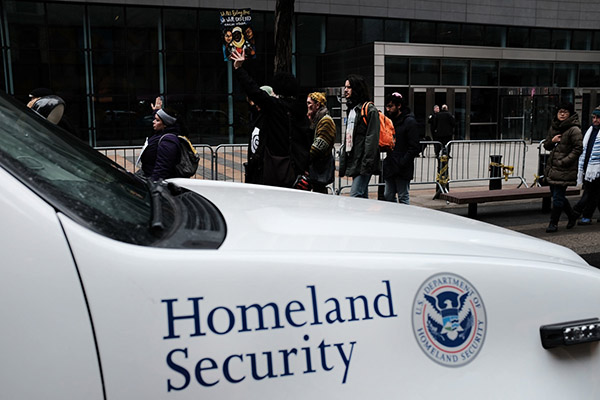FOR IMMEDIATE RELEASE
August 24, 2018
CONTACT
– Hayley Burgess, National Immigration Law Center, 202-805-0375, [email protected]
– Lisa Sherman-Nikolaus, Tennessee Immigrant and Refugee Rights Coalition, 646-584-5281, [email protected]
– Jen Fuson, SPLC, 334-956-8226, [email protected]
– Amy Lebowitz, National Employment Law Project, 646-200-5322, [email protected]
Tennessee OSHA Slams Meatpacking Plant Where Massive ICE Raid Took Place with 27 Violations and $41,775 in Penalties
NASHVILLE — The Tennessee Occupational Safety and Health Administration (TOSHA) has slammed the Southeastern Provision meatpacking plant in Bean Station, Tennessee, with $41,775 in fines and cited the company for 27 violations, 23 of which were categorized as “serious” because of the risk of physical harm or death posed to workers. These violations and investigations came to light after a raid of the plant in April, during which U.S. Immigration and Customs Enforcement (ICE) agents used aggressive, militaristic force to arrest nearly a hundred workers, including at least one U.S. citizen and others with work authorization.
The fine is among the highest levied by TOSHA and indicates the seriousness of the violations found by the state agency and the dangers facing the workers in the plant. The TOSHA investigation found that the company failed to provide even the most basic safety equipment and sanitary facilities, creating an extremely hazardous work environment for plant employees. Employees faced a wide range of injuries due to dangerous levels of noise, exposure to chemicals, faulty equipment, and poor sanitation.
Southeastern Provision has flagrantly violated laws that are intended to protect all workers in this country. In addition to these egregious safety and health violations, the company is currently being investigated by the U.S. Department of Labor (DoL) for violations of wage and hour laws. The company’s owner agreed to plead guilty last week to criminal charges related to tax evasion and failure to pay workers’ compensation and unemployment insurance. These charges resulted from his practice of paying his employees off the books and underreporting his employees’ wages to the state and federal government.
Copies of the TOSHA citations can be found here:
- www.nilc.org/wp-content/uploads/2018/08/Citations-to-Southeastern-Provision-TOSHA-Safety-2018-08-22.pdf
- www.nilc.org/wp-content/uploads/2018/08/Southeastern-Provision-LLC-1309726.pdf
In response to this development, the following individuals issued these statements:
Stephanie Teatro, co-executive director, Tennessee Immigrant and Refugee Rights Coalition (TIRRC):
“Meatpacking is already among the country’s most dangerous jobs, but Mr. Brantley failed to provide even the most basic protections, putting the health, safety, and lives of his employees at risk. When employers and the government hold the threat of deportation above workers’ heads, they are less likely to report dangerous conditions like those that persisted at Southeastern Provision. The administration’s escalating use of worksite raids has instilled a greater sense of fear in workers across the country, enabling employers like Mr. Brantley to dangerously cut corners.”
Jessie Hahn, labor and employment policy attorney, National Immigration Law Center (NILC):
“These citations confirm what we have known to be true through the firsthand accounts of several former employees. Mr. Brantley is intentionally and blatantly defying required workplace health and safety standards — and putting his employees in grave danger — in order to save himself money. Despite many employees suffering injuries and some having to seek treatment at the hospital, he did not keep any of the required records of injuries, he encouraged his employees to deny their injuries were work-related to hospital staff, and to date he has not taken any action to improve safety conditions. These citations are an important step, but much more must be done to ensure the safety and wellbeing of all Southeastern Provision employees now and in the future.”
Mary Bauer, deputy legal director, Southern Poverty Law Center (SPLC):
“Southeastern Provision knowingly endangered its workers by failing to adhere to basic worker safety and health laws. Although the company kept no records of worker injuries, we know people did get injured. Southeastern Provision also evaded federal tax laws and is under investigation for not paying overtime.
“Companies like Southeastern Provision that put profit over the dignity and safety of workers gain an unfair advantage over honest competitors who live up to their obligations under the law. Rather than ripping vulnerable and exploited workers from their families, detaining them, and threatening to deport them, the federal government should focus enforcement efforts on employers who put workers at risk and evade their obligations to pay taxes and pay their workers.”
Deborah Berkowitz, worker safety and health program director, National Employment Law Project (NELP):
“Instead of targeting and arresting the workers, this administration and Tennessee’s counterpart agencies must hold this employer fully accountable for violating not only tax laws, but for the egregious violations of basic worker protections done to simply inflate profits and undercut competitors. Employees at Southeastern Provision have experienced conditions and dangers that no worker anywhere should have to endure.”
###







